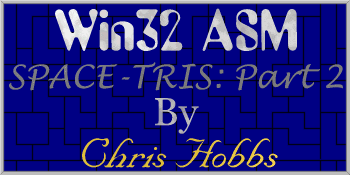11/10 - 11/12 @ Montréal, Canada
12/5 - 12/7 @ Shanghai, China
12/24 - 12/27
2/28 - 3/4 @ San Francisco, CA
More events...
2406 articles in the reference section.
Help us fight cancer!
Join SETI Team GDNet!

|
Where Did We Leave Off?The last article discussed many basics of Win32 ASM programming, introduced you to the game we will be creating, and guided you through the design process. Now it is time to take it a few steps further. First, I will cover, in depth, the High Level constructs of MASM that make it extremely readable ( at generally no performance cost ), and make it as easy to write as C expressions. Then, once we have a solid foundation in our assembler we will take a look at the Game Loop and the main Windows procedures in the code. With that out of the way we will take a peek at Direct Draw and the calls associated with it. Once, we understand how DirectX works we can build our Direct Draw library. After that we will build our bitmap file library. Finally, we will put it all together in a program that displays our Loading Game screen and exits when you hit the escape key. It is a pretty tall order but I am pretty sure we can cover all of the topics in this article. Remember: If you want to compile the code you need the MASM32 package, or at the very least a copy of MASM 6.11+. If you are already familiar with MASM's HL syntax then I would suggest skipping the next section. However, those of you who are rusty, or have never even heard of it, head on to the next section. There you will learn more than you will probably ever need to know about this totally cool addition to our assembler. |
|
|
|
|